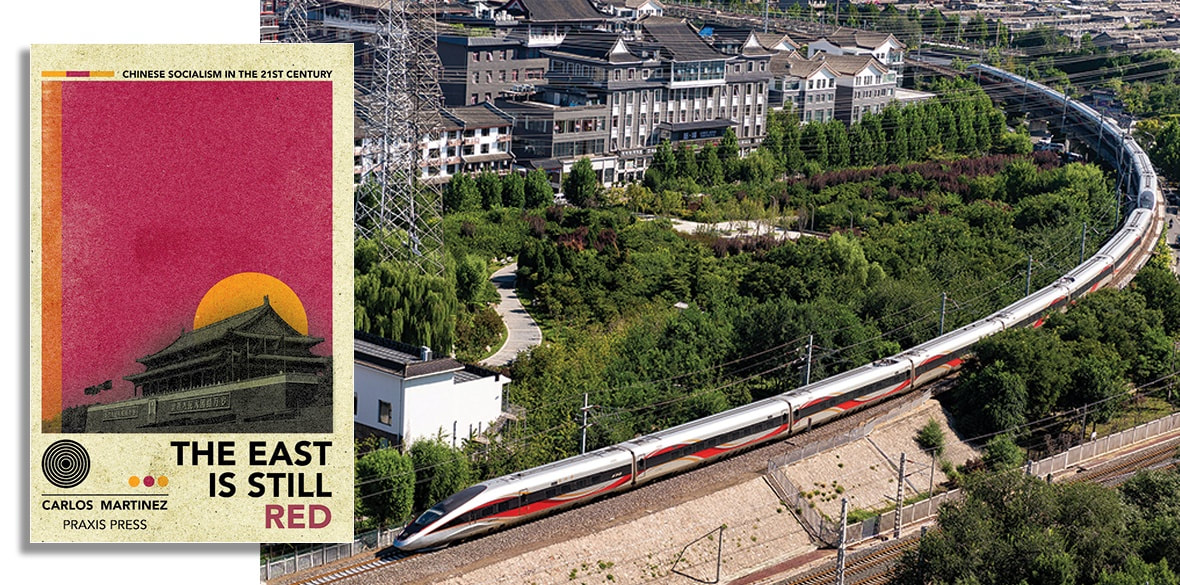|
Recognising how important it is for Today’s Left to understand China, BEN CHACKO recommends a highly readable and well-researched book of essays CHINA looms large in today’s world. Its economy is predicted to exceed the US’s in size within the decade; by purchasing power parity, it is already larger. It is racing ahead too in diplomacy and trade: it has now replaced the US as the country with the most diplomatic missions overseas, and is the biggest trading partner of a majority of countries globally. This very success — China’s status as the United States’ only acknowledged “peer competitor”— could be the reason China is now routinely depicted as a menace. Britain’s BBC dutifully takes up scares over weather balloons and breathless reports on Chinese aircraft or ships’ “aggressive” conduct in encounters with US counterparts — which for some reason always take place just off the Chinese, not the American coast. Projects like the Belt & Road Initiative, which overtook the World Bank as the biggest development finance lender in 2019, are seen as evidence of a sinister new imperialism. Understanding China could hardly be more important for today’s left. The “China threat” is a key justification for a major plank of British state policy: huge increases in arms spending and the first “east of Suez” military deployments in many decades. This could mean World War III: a serving US general predicts that happening the year after next. Armageddon could result from current China policy in other ways: sanctions and economic “decoupling” are cutting us off from the world leader in renewable technology and undermining scientific co-operation on global warming or pandemics. Socialists need to know how we respond to these challenges. Carlos Martinez’s new book The East is Still Red is an excellent guide. Whether China is socialist, as its ruling Communist Party argues, is a divisive topic but with an eye on history Martinez draws out the consistencies in the country’s course since 1949. Chapter 1, No Great Wall, looks at how the “reform and opening up” period begun by Deng Xiaoping from 1978 built on achievements of the Mao years, without underrating the huge policy differences that did occur, or whitewashing either era. Later, in Will China Suffer the Same Fate as the Soviet Union, Martinez contrasts the two and points both to underlying strengths in China’s model and the lessons its party leadership has learned from the Soviet collapse. Many are familiar with impressive headline figures such as China lifting 800 million people out of poverty — but Western accounts tend to imply this is the undirected result of introducing “the market,” though capitalist market economies such as India or Brazil cannot point to similar achievements. Martinez delves into the details and looks at the targets, the plans, the actual measures taken to deliver the greatest improvement in human welfare in recorded history. For a Western left audience, key chapters are those on how China is making progress towards “ecological civilisation” — and why a “plague on both your houses” position dubbed Neither Washington Nor Beijing is untenable in a context where the US is unambiguously the aggressor in the new cold war while China’s rise is widely welcomed in the global South. Later, he adopts Noam Chomsky’s famous phrase “manufacturing consent” while looking at the media’s coverage of China and how issues are distorted to build support for our own ruling class’s hostility to it: essential reading here is a demolition of the wild claims made about alleged abuses in Xinjiang and their less than objective origins. Developed from articles written on different aspects of China and its revolution — many originally published in the Morning Star — this is a highly readable narrative that doesn’t presuppose detailed knowledge of Chinese history or politics. The thematic character means many chapters work well on their own, and will make it a handy reference point for anyone wanting to brush up on specifics like the anti-poverty campaigns or China and climate change. It’s extensively referenced, and welcome in quoting more Chinese than foreign sources on the country. Highly recommended. AuthorMorning Star This article was produced by Morning Star. Archives July 2023
2 Comments
Ross Coyle
7/10/2023 12:29:44 am
From tragedy to farce; Britain's BBC dutifully takes up the line of 'worrying' about Chinese spy balloons (tragic), then Ireland's RTE dutifully clutches pearls over supposed Chinese spyware in Leinster House.....(farcical)
Reply
RR
7/12/2023 03:56:21 am
Those enjoying Mao's “better financial and economic situation” today include China's 1% and their counterparts in the US:.
Reply
Leave a Reply. |
Details
Archives
July 2024
Categories
All
|

 RSS Feed
RSS Feed